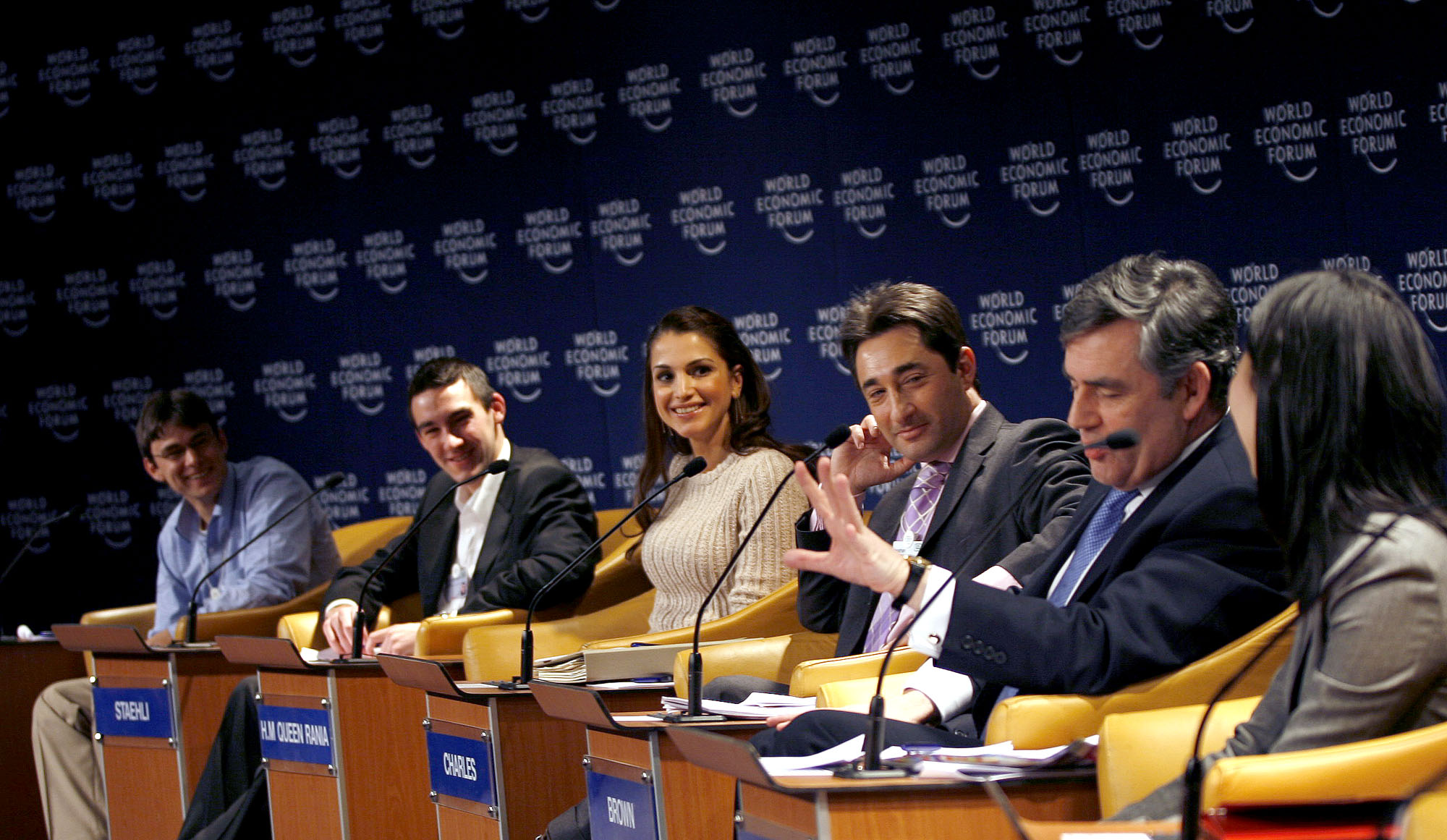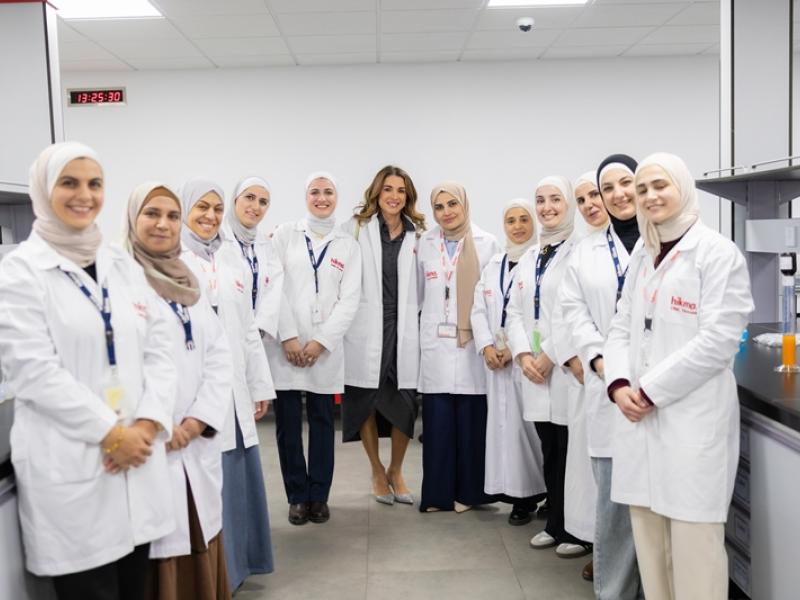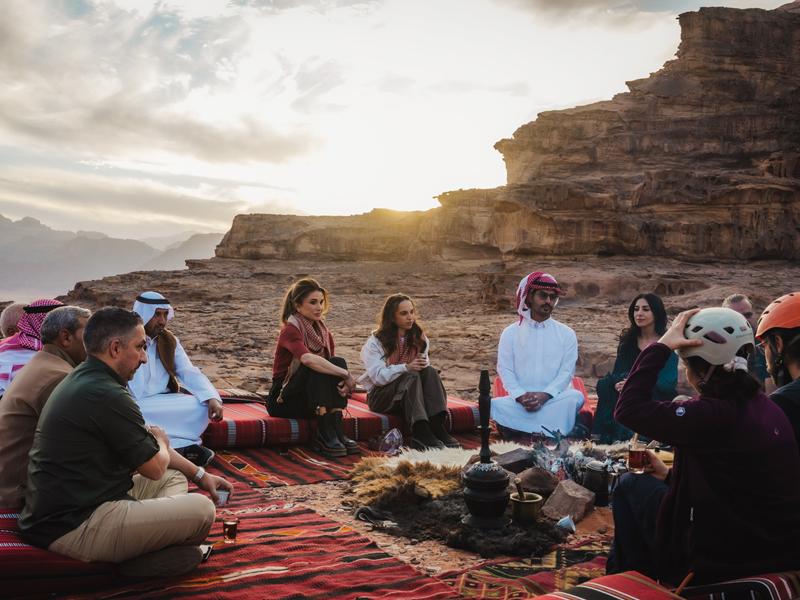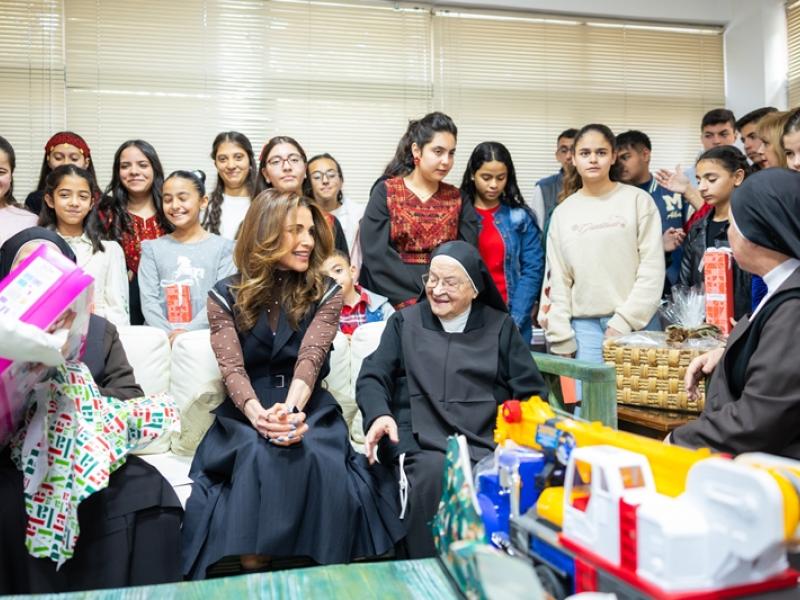(Office of Her Majesty, Press Department – Davos) It is not every day that youth take center stage amidst leaders at the World Economic Forum. They did just that as five youth joined Her Majesty Queen Rania Al-Abdullah of Jordan and Chancellor Gordon Brown of the United Kingdom in a frank panel discussion where they voiced their concerns about the state of the world and challenged the leaders to set up a Global Education Fund.
The youth identified two pressing challenges in today's world: the need for collective action to ensure quality global education, and the need for active global citizens who strive for unity and diversity.
Her Majesty welcomed the youth, who partook in the youngest panel discussion to take place at the forum. "We have to look at young persons not just as persons in the making, but as active agents, as people who we have to bring into the conversation…increase their participation, recognize their voices and include them in the decision making process," said Queen Rania.
Queen Rania, who is an advocate of youth empowerment, recognizes the need to include youth in the decision making process. "Because the young people have information so readily available nowadays they've acquired a kind of wisdom—they're much wiser than I was at that age—they have an unconventional wisdom that comes with a fresh outlook and creativity," she said.
On that note, the youth said that after an intense workshop in Greenwich, England last week, they outlined the necessities that they feel are essential for youth everywhere. "We want to create generations that are socially responsible and tolerant," said one of the panelists, "we challenge you to create a Global Fund for Education." The panel cited the success of the Global Fund fight AIDS, Tuberculosis and Malaria that was established during one of the previous World Economic Forums in Davos.
Her Majesty talked about two different types of generational challenges facing the youth today: "There's a vertical challenge and a horizontal challenge. The vertical challenge is between generations, but more important is the horizontal challenge among youth of the same age but in different countries. So, it's a geographical challenge."
Elaborating on that challenge, Her Majesty said that geography determines destiny using the differences between Sweden and Sierra Leon as an example. "The Swedish woman can look forward to living to 83. She has a bright future ahead of her -- most likely, enhanced by a college education, and supported by a generous welfare state that offers excellent health care and childcare But the young woman from Sierra Leone is already middle aged -- in the sense that life expectancy for women in her country is 43. She will probably bear six children before then, and bury at least one. Per capita income in Sweden is roughly $39,000. In Sierra Leone, it is $210. These women are endowed with equal dignity and rights -- yet the opportunities they enjoy are profoundly different."
During the workshop last week, the youth had determined that investing in teachers is the key factor to ensuring the world's youngest citizens have access to quality education. "The Fund should focus on three key factors: quality teacher training, reducing absentees, and smaller class sizes," said the youth.
Class sizes are a determining factor in quality education, noted one of the youth panelists. When one teacher can dedicate his or her attention to 12 students, as is the case in Switzerland, that teacher can deliver much more quality education than a teacher in Mali who must split his or her time, resources, and energy among an average of 71 students.
Her Majesty agreed with the group, saying that in the past decade or so, jobs in education have lost their intrinsic value. "In terms of quality, we can upgrade facilities and curricula but the one thing that brings all of that to life is the teachers," said the Queen. "If you have quality teachers that are committed, that are inspired, that can motivate their students, and that makes all the difference. In Jordan, that's one of the things that we're really focusing on… it's about bringing honor and prestige back to the profession because it has such a large impact."
As the youth outlined the challenge of providing quality education, Chancellor Brown commended their thorough action plan: "What we have today is idealism plus a plan for action…and we must make it a priority to ensure that each child has access to education…which is possible over the net few years." Brown has outlined a plan of his own for ensuring quality education by combining the wealth of the most industrialized countries with the need of underdeveloped nations. The total cost for such an education plan, according to Brown, is $2 per week, or 4 cents per day. "This is the most cost effective investment," he said.
On an investment note, Her Majesty said, "When we talk about access, we should think of gender parity because investing in girls' education is the highest returned investment… When you put a girl through school, you can really change the course of a nation. It is a double dividend. It improves the quality of life for women and allows them to achieve their own rights but it also helps with children... they enjoy better health and better economic conditions."
Also, Brown commented that in today's technologically savvy world, there should be link-ups between schools in different regions, teachers from different backgrounds and students with similar yet different challenges. The idea of using such technological advancement is something Her Majesty has already began promoting and she participated in a youth link up in the Philippines in December 2006. Peace Tech, an initiative that brought together youth from two different troubled areas in the Philippines, used a live satellite linkup to facilitate communication among the youth. Her Majesty supported the youth through a taped message of support where she commended their initiative to unify their voice and get the government's attention in saying what they need.
Supporting what this panel had said about the need for active global citizens who strive for unity and diversity, Her Majesty said mutual knowledge is the best way to do that. "That's what allows people to crawl out of their shell, reach out to the people in front of them and create harmony in society, which we all need in order to advance," she said.
The British Council chose the youth that participated in this Wisdom of Youth Panel as the best representatives of youth issues from around the world. The panel included young women and men from Egypt, Mauritius, Switzerland, Australia, and South Korea. They represented a truly global outlook and cited inspiring examples of youth challenges from around the world.
In addressing the youth, Her Majesty said, "you are a transformative force…. The more we stay linked to you, your views and aspirations, the more we can serve you".



